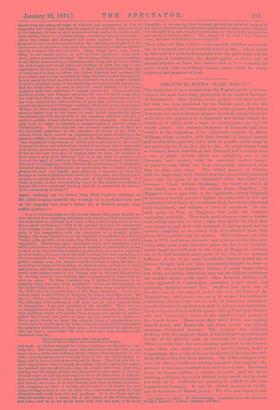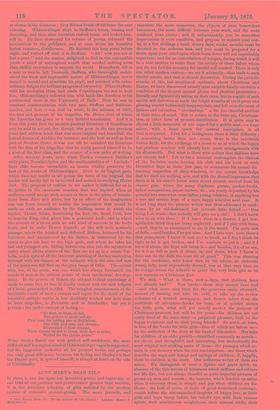(EHLENSCHLEGER'S "EARL HAKON."*
THE book that is here presented to the English public is in some respects the most interesting production in the modern literature of Scandinavia. More delicate, more perfect, even more power- ful work has been produced by the Danish poets of the last generation, and by the Norwegian poets of the present, but Hakon Jarl preserves and is likely to preserve its totally unique character as the first full expression of a completely new artistic school, the traditions of which, after a lapse of seventy years, are not yet wholly extinct. The dramatic literature of Denmark had been created in the beginning of the eighteenth century, by Baron Holberg, whose comedies, with their breadth of human interest and inexhaustible geniality, have been as popular on the stage as any pieces can be from that day to this ; the comic drama being so founded, Ewald introduced into Denmark half a century later a vein of plastic lyricism which was completely new to the literature, and started, with his operettas, another branch of poetical work which has been successfully cultivated, from time to time, ever since. The stilted manner of Voltaire held the tragic stage until Wessel slew that painted and powdered muse with the spear of his irresistible satire, Kjcerlighed uden &romper : "Love without Stockings," the result of which at first simply was to destroy the serious drama altogether. In Baggesen arose a poet such as the eighteenth century delighted to honour, a shrewd, practical thinker in verse, full of wit and sensibility, full of fancy of a humdrum kind, but wholly ephemeral and uncultured, and without a trace of sentiment. It was such poets as Voss, as Baggesen, that made the romantic movement inevitable. They made good common-sense a burden that nobody was able to bear ; when they would be ideal they were pompous, and their only approach to lasting merit was the extreme simplicity of the russet style they adopted when they threw off the powder and the patches. (Ehlenschlteger, who was born in 1779, and whose character was perhaps weaker than that of any other poet of the first class whose life has been recorded, would simply have followed in the steps of Baggesen, and been one of the half-hundred minor poets of the day, if the personal influence of one of the most remarkable thinkers in that age of fervent thought had not been vehemently brought to bear on him. He was a fat, lymphatic student of nearly twenty-three, full of the moonshiny enthusiasm that was the highest excitement his unaided nature could attain, when Heinrich Steffens sud- denly appeared in Copenhagen, preaching a new creed, and gathering disciples around him. Steffens had been one of the first men in Germany to preach the new doctrines of the Romanticists,—that poetry was not a fit subject for fashionable eclecticism, that its scope was as wide as humanity, and that it found its fittest shrine in what was exalted, antique, and mysterious. Tieck had pointed back to Shakespeare, Schlegel had gone further still, and demanded a return to the simplicity and passion of the Greek drama. These were days when Fichte was making himself heard, and Humboldt, and when Goethe was already assuming dictatorial honours. The eloquent and vivacious Steffens, with the magnetic charm of his personal appearance and the fire of his delivery, made an enormous stir in Copenhagen Whoever could bear the new doctrine gathered to his lecture- room ; those who could not, reviled ; and the literary world of Copenhagen, then a very wide one for the size of the city, was sud- denly divided into two fierce factions. On CEhlenschlner, how- ever, the effect of Steffens's teaching was more than magical ; the presence of this man troubled him and moved him. He ceased work ; he became restless ; a volume of poems, paid for by an admiring publisher, lay nearly finished in his hands, but he could not work on it. Suddenly one morning he called on the new teacher from Germany. It was the critical moment of his life, and of the future of Danish poetry. The two men began to talk
Earl Eaton the Mighty. By (Ehlensehlseger. Translated from the Danish by Frank 0. Laseelles. London : Chapman and Hall.
at eleven in the forenoon ; they did not break off till three the next morning. CEhlenschlasger slept in Steffens's house, tossing and dreaming, and then after breakfast rushed home, and locked him- self in. He then destroyed his volume of poems, returned the honorarium to the publisher, and at once wrote his beautiful lyrical romance, Guldhornene. He finished this long poem before night, and rushed off with it to Steffens. " Ah ! now you are at last a poet !" said the master, delighted to find in this susceptible youth a mind of unimagined wealth that needed nothing more than skilful excavation to surprise the world. Henceforth, till in a year or two he left Denmark, Steffens, who thoroughly under- stood the weak and impressible nature of CEhlenschlmger, never ceased to mould and stimulate his pupil, and watched with extra- ordinary delight the brilliant progress of his poetry. When Steffens, with his neologian ideas, had made Copenhagen too hot to hold him, CEhlenschlteger followed him with lamb-like devotion to his professorial room in the University of Halle. Here he was in constant communication with two men, Steffens and Schleier- macher, and here it was that he wrote, in the autumn of 1805, the first and greatest of his tragedies, the Hakon Jarl, of which Mr. Lascelles has given us a very faithful translation. And it is from this point that the modern poetical literature of Scandinavia may be said to set out, for though the poet in the two previous years had written much that was most original and beautiful, the lyrical drama of Aladdin, for instance, and the best as well as first part of Nordens Gilder, it was not till he enriched the literature
with the first of his tragedies that he really proved himself to be a poet of the first class, and the creator of a new order of writing. After seventy years, now, when Tieck's romances, Schiller's
early plays, Novalis's lyrics, and the sentimentalities of " Lucinde have alike become unreadable, an innate vitality preserves the best of the works of CEhlenschlteger. Even in its English garb, which does not render in all points the force of the original, the reader will hardly fail to be excited and moved in studying Hakon Jarl. The progress of realism in art makes it difficult for us to do justice to the enormous reaction that was implied when an audience could accept such scenes as these in the place of transla- tions from Zaire and Alzire, but by an effort of the imagination one can force oneself to realise the impression that would be made on such an audience by the thrilling scene in which the traitor, Thorer flake, instructing his fool, the thrall Grib, how to murder King Olaf, gives him a poisoned knife, and in which the screech of a raven stirs an odd kind of remorse in the fool's brain, and he stabs Thorer himself ; or the still more masterly passage, where the hunted and defeated Hakon, betrayed by his
followers and unanswered by his deities, is instructed by the runes to give his best to the high gods, and where he takes his last and youngest son, Erling, before sun-rise, into the mysterious valley where all the statues of the )Esir are set up in a mimic Val- halla, and in spite of all the innocent prattling of the boy smites him through with his dagger, at the moment when the rose-red rays of the misty sun fall first on the gray image of Odin. The central idea, too, of the poem, was one which has always fascinated the minds of men at the critical points of their intellectual develop- ment. In the person of Hakon the old and violent mythology is
made to come face to face in deadly contest with the new religion of Christ, personified in Olaf. The mingled consciousness of the inevitable result of such a contest and regret for the death of the beautiful antique myths is less decidedly worked out here than in later tragedies, in Palnatoke and in Stmrkodder, but yet it pervades the under-current of feeling :— " So fleet, so faint, so fair,
The powers of earth and air Fled from the folding star of Bethlehem.
Our hills, and seas, and streams, Dispeopled of their dreams, Their waters turned to blood, their dew to tears, Wailed for the golden years."
What Shelley fluted out with perfect self-confidence, the more diffident and lees logical mind of CEhlenschlmger vaguely suggested; but the suggestion underlies all his greatest works, and perhaps the only great difference between his feeling and Sheljey's is that the Danish poet, in spite of himself, is always at heart on the side of Christianity.







































 Previous page
Previous page